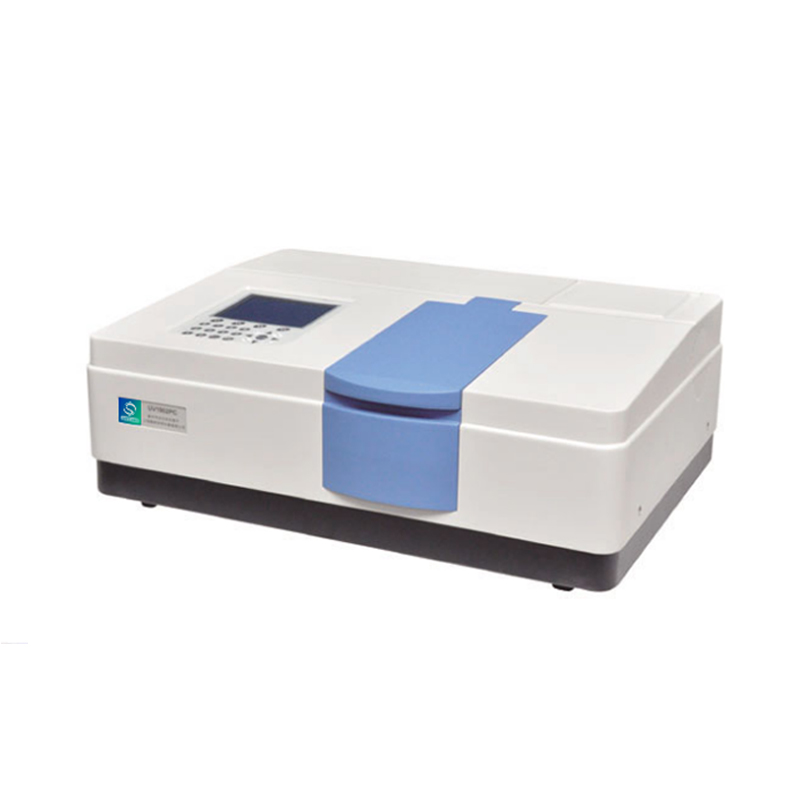
Products Series
- UV Radiometer
- UV Energy Meter
- Lens Transmission Meter
- Optical Density Meter
- Friction Testing Machine
- Coating Thickness Gauge
- Surface Roughness Gauge
- Gloss Meter
- Laser Interferometer
- UV/VIS spectrophotometer
Contacts

Phone:0755-23158752
Fax:0755-23763184
Mobile:15118149162
E-mail:nick@zreexing.com
Q Q:1144986731
Address:601, NO.1 building, hesheng Industrial Zone, hebei industrial park,Longhua New District, Shenzhen
UV/VIS spectrophotometerHome > Products > UV/VIS spectrophotometer

Instrument Features:
l Display: 6-inch 320×240 dot matrix digital LCD with backlight
l Light Source: Japanese Hamamatsu environmentally friendly (ozone-free) deuterium lamp and Osram long-life halogen lamp
l Optical System: Precision double-beam optical system
l Interfaces: USB, RS232C serial communication port for software connection, and parallel printer port for printer connection
l Spectral Scanning Function: Supported by both the main unit and software
l Power Supply Voltage: 100V–240V, 50/60±1Hz
l Instrument Dimensions: 650*450*220 (mm)
l Net Weight: 25kg
l Temperature: 5°C - 40°C
l Humidity: ≤85%
l The newly designed double-beam optical system provides excellent optical performance; the high-performance holographic grating ensures low stray light in the instrument.
l Advanced circuit measurement and control system design gives the instrument high stability and extremely low noise.
l The removable sample chamber design allows easy replacement of different accessories to meet various analytical needs.
l Spacious open light source chamber design makes lamp replacement more convenient.
l Key components are selected from imported devices, ensuring high reliability of instrument performance.
l Bilingual (Chinese and English) operating software developed under Windows environment provides rich and unique analytical features.
Technical Parameter:
Measurement Mode | Transmittance, Reflectance |
Wavelength Range | 190nm–1100nm |
Sample Size | 10*10mm–100*100mm |
Spectral Bandwidth | 1nm |
Stray Light | ≤±0.03%T (220nm, 360nmNaL) |
Wavelength Accuracy | ≤±0.3nm |
Wavelength Reproducibility | ≤0.1nm |
Wavelength Display | 0.1nm |
Wavelength Setting | 0.1nm |
Measurement Range | 0-99.999% |
Photometric Accuracy | ≤±0.3 %T (0 ~ 100 %T) |
Photometric Reproducibility | ≤0.15%T (0-100%T) |
Monochromator Stability | Holographic grating ≤±0.0003A/h (700nm, after 1-hour warm-up) |
Noise | ≤±0.0003A |
Power Supply | 100/240V, 50/60±1Hz |
Derivative Fraction | >0.5nm |
Scanning Speed | Wavelength movement: Approximately 3000nm/min Wavelength scan: 24nm/min – 1400nm/min |
Fixtures | Transmittance fixture + Reflectance fixture |
Light Source Switching Wavelength | Automatic switching, can be set within the range of 295-364nm |
Instrument Functions:
l Photometric Measurement: Capable of simultaneously measuring transmittance and reflectance at 1 to 6 wavelengths.
l Spectral Measurement: Conducts transmittance and reflectance spectral scanning within the wavelength range and allows various data processing such as peak detection, derivative calculations, and spectral calculations.
l Quantitative Measurement: Single-wavelength, dual-wavelength,
triple-wavelength, and multi-wavelength determinations. Work curves for 1 to 9 points (1 to 3 times) regression.
l Kinetic Measurement: Time scanning of transmittance and reflectance at any set wavelength, with various data computations available.
l Data Output: Allows access and storage of data files and parameter files, with measurement results output in standard universal data file format.
l PC Software Functions: UVCON control software developed for the Windows environment enables comprehensive control of the main unit. This includes data acquisition (single point measurement, multi-point measurement, spectral scanning, quantitative measurement, time scanning, and DNA measurement) and various data processing functionalities.
l Standardization, peak detection, area calculation
l Zooming, smoothing, reciprocal, arithmetic operations, T–A conversion of spectra
l Single-wavelength and multi-wavelength quantitative measurement
l K coefficient method, single-point work curve method, multi-point work curve method, allowing for function fitting of 1 to 3 times
l Outlier removal method in quantitative analysis
l Ability to correct curve coefficients
l Massive storage for scanning spectra, work curves, and test results
l Test reports output in standard file format
l Printer selection is flexible
Application:
l Teaching and Research: Applicable for the determination of complex compositions, kinetic studies, determination of acid-base dissociation constants, and photometric titrations.
l Environmental Monitoring: Capable of monitoring water quality, atmosphere, precipitation, and soil in accordance with national standards, measuring the content of various pollutants.
l Life Sciences: Able to test trace samples in the life sciences field, providing DNA/protein detectors for rapid measurement of DNA/protein concentrations. Different analytical methods can also be set to meet various needs.
l Manufacturing: Applicable in process control in industrial production, analysis of organic synthesis intermediates, analysis of additives, preservatives, and fragrances in food, and measurement of nutritional components such as fats, enzymes, sugars, minerals, and vitamins in food and cosmetics.
l Petrochemical Industry: Applicable in process control and finished product inspection in petrochemical production.
l Health and Epidemic Prevention: In medicine and health, clinical analysis, disease control analysis, trace sample testing in life sciences, biochemical indicator analysis, and metabolic product analysis.
l Geological Exploration: Applicable in determining metal elements and inorganic salts in mineral resources, marine geological exploration, and hydrological stations.
l Water Quality Analysis: Applicable in water treatment plants and wastewater treatment plants.
l Agriculture and Forestry: Applicable in various specific industries of agriculture and forestry, such as pesticide residue testing, crop composition testing, fertilizer testing, soil composition testing, plant protection, and plant quarantine.
l Animal Husbandry and Fishery: Applicable in veterinary drug testing, feed testing, and disease prevention in animals.
Next:UV-VIS light Spectrophotometer SDR1910